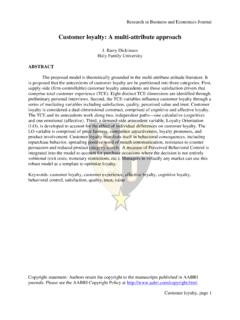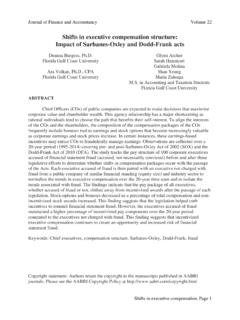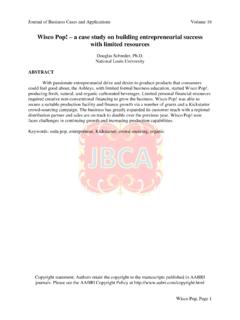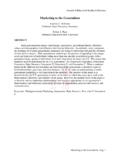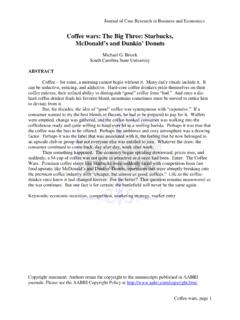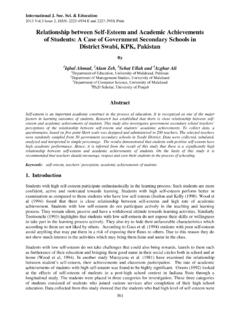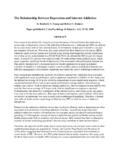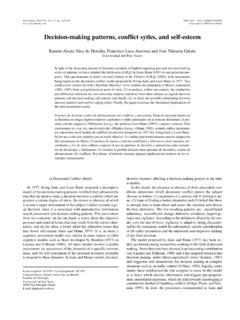Transcription of Role of Relationship Marketing in Competitive Marketing ...
1 Journal of Management and Marketing Research Role of Relationship Marketing in Competitive Marketing Strategy Nagasimha Kanagal Indian Institute of Management, Bangalore Abstract Competitive Marketing Strategy (CMS) has Relationship Marketing (RM) as one of the key functionality in enhancing business performance. RM is defined as the identification, establishment, maintenance, enhancement, modification and termination of relationships with customers to create value for customers and profit for organization by a series of relational exchanges that have both a history and a future. Relational exchanges can be viewed under transaction cost analysis and social exchange theories depending on the context.
2 The role of RM in CMS includes: guide moments of truth, improve profitability, build partnering, address Customer Better , buy in of customer attention, protect emotional well being, understand consumer psyche, build trust with customer. All these roles are observed empirically in the hotel industry, with some hotels placing emphasis on their extraordinary operations and services to engage with the customer. Key words: relational exchanges, emotional well being, trust, profitability, partnering Journal of Management and Marketing Research Role of Relationship Marketing , Page 2 INTRODUCTION The purpose of Competitive strategy is to achieve a sustainable Competitive advantage (SCA) and thereby enhance a business performance (Bharadwaj, 1993).
3 One of the major objectives of Marketing strategy is to enhance the long-term financial performance of a firm. As such Competitive Marketing strategy serves to improve financial performance of the firm through the route of sustainable Competitive advantages. There are four essential requirements for a resource/ skill to be a source of SCA (Barney, 1991). It must be valuable; it must be rare among competitors; it must be imperfectly imitable; there must not be any strategically equivalent substitutes for this resource skill. Sources of SCA leads to positional Competitive advantage (differentiation and low cost).
4 Sustainability of positional advantages leads to superior long-term market and financial performance. Formulating Competitive Marketing strategies also involves, recognizing relationships between elements of the Marketing mix as well as assessing the impact of Competitive and market conditions on Marketing mix formulation. A model (Carpenter, 1987) has been outlined of the Relationship between product quality levels, promotion expenditures and prices and assesses the impact of industry structure on the formulation of Marketing mix. Relationship Marketing serves as a moderator for the sustenance of positional advantages and influences the impact of Competitive and market conditions on the formulation of the Marketing mix.
5 Competitive advantage is realized based on three factors (Sudarshan D, 1995): (1) the firm s Marketing strategy, (2) implementation of this strategy and (3) the industry context (Porter s model). An important component of firm s Marketing strategy is relationships. Relationships with customers, channel members and with competitors. He defines each Relationship by the identity of the partner public and the contract with it. Importance and Objective of the study: There are two important streams of conceptual and empirical work in strategic Marketing that have developed more or less independently during the past 10 years (Steinman, Deshpande and Farley, 2000), although the two are inherently interrelated.
6 One stream is market orientation which focuses on the extent to which a customer focus binds suppliers and customers together. The second stream is Relationship Marketing , which principally focuses on efforts of sellers, but also of buyers to some extent, to move from single transaction consummation to investment in longer term streams of mutually profitable partnership behaviors ( Anderson and Weitz, 1989; Dwyer, Schurr and Oh, 1987; Morgan and Hunt, 1994; Weitz and Jap, 1995). In this context, the following objectives are laid for studying the role of Relationship Marketing in Competitive Marketing strategy: (1) Competitive Marketing strategies (CMS) is a systematic action setting process as much as it is a dynamic adjustment process.
7 By studying role of Relationship Marketing (RM), proper accordance can be given to RM in the systematic action setting. This helps improve the effectiveness of CMS formulation. (2) By studying role of RM, Marketing programs can be suitably designed to attract, develop customer segments. Resource allocations can be made more effective. Journal of Management and Marketing Research Role of Relationship Marketing , Page 3 (3) If a particular market needs more relational Marketing , then that market can be appropriately addressed for strategic decision making by studying role of RM. The study is useful to Marketing strategists who need to take Relationship - Marketing efforts into account and is also useful to Relationship marketers who need to relate to strategic Marketing heads.
8 In the study, first we examine the nature of Relationship Marketing . Second we lay out the framework of Competitive Marketing strategy and delineate the position of relationships. Third we conceptualize the role of Relationship Marketing to Competitive Marketing strategy. Fourth we empirically test the role of Relationship Marketing . NATURE OF Relationship Marketing At the core of Relationship Marketing is exchange, that is profitable to parties involved in the exchange. The concept of exchanges as it applies to Relationship Marketing can be viewed at from either a transaction cost analysis approach or a social exchange theory approach.
9 Transactions are distinguished into discrete transactions and relational transactions. Relational contract law governs relational transactions. In classical contract law that governs discrete transactions identity of parties is not relevant; however this is not true in Relationship Marketing . In relational contracting the reference point shifts from the agreement (as in classical contract law), to the relation itself as it has developed over time. There might be or might not be an original agreement and if there is, there may not be any great deference to it. In a relational transaction, the contractual gaps between parties are reduced, as the relation becomes stronger and stronger.
10 The frequency with which transactions recur influence the terms of the transaction (discounts as in frequent flyer). The degree to which durable transaction specific investments are incurred determine the rapidity of commitment given and received, the time period of commitment and the intensity of the relation between two parties. Transaction specific investments (asset specificity in physical capital and human capital) leads to relational exchanges where trust is a prime moderator. As such non-specific exchanges leads to transaction Marketing and for exchanges that are not non-specific the concept of Relationship Marketing will hold (Williamson, 1979).

